February is Black History Month! |
This month we are featuring "Black History Month: A Medical Perspective," our online exhibit containing a chronology of medical achievements of African Americans, a section on folk medicine, and a selective bibliography.
ClinicalKey for Nursing Replaces Mosby's Nursing Consult
Jamie Conklin, Research & Education
If you haven't already, it's time to say goodbye to Mosby's Nursing Consult and hello to its replacement — ClinicalKey for Nursing. Elsevier's new product has all the same great evidence-based content found in both Mosby's Nursing Consult and Mosby's Nursing Skills, including:
- More than 60 ebooks and 50 journals, clinical skills, Mosby's Evidence-Based Nursing Monographs, and drug monographs
- Practice guidelines, clinical updates, labs, patient education materials, and other clinical tools
While the content remains largely the same, the interface and navigation differ. Here are some tips to guide you in the new platform.
- The main navigation feature of ClinicalKey for Nursing is its Smart Search function. The search defaults to all types of content, so to narrow your results set, select a specific type from the drop-down menu.
- If you need to narrow your results further, simply use the available filters at the top of your results set. (These will include specialties, source type, study type, and date, depending on which type of source you are viewing.)
- If you prefer to browse content, use the drop-down menu links to "Books" "Journals" and "More" in the Browse area near the search box.

For more information or for help in using ClinicalKey for Nursing, feel free to Ask a Librarian!
Historical Materials about African Americans at Duke Medicine
This issue highlights the research guide, African American History at Duke Medicine, produced by Medical Center Archives. The guide aims to introduce researchers to materials documenting the history of African American faculty, students, and staff at Duke Medicine. Included are oral histories, archival collections, photographs, audiovisual materials, and publications, selected key dates and key figures, and links to recommended digital resources.
 |
Special Tribute to Dr. William Anlyan – Library Supporter and Friend
Pat Thibodeau, Associate Dean for Library Services & Archives
Dr. Anlyan was many things to Duke for many years, but few probably know his strong role in the creation of the current Medical Center Library facility. In addition to many other buildings constructed during his time as Chancellor and Vice President of Health Affairs, the Mudd building was an outcome of his planning and leadership. 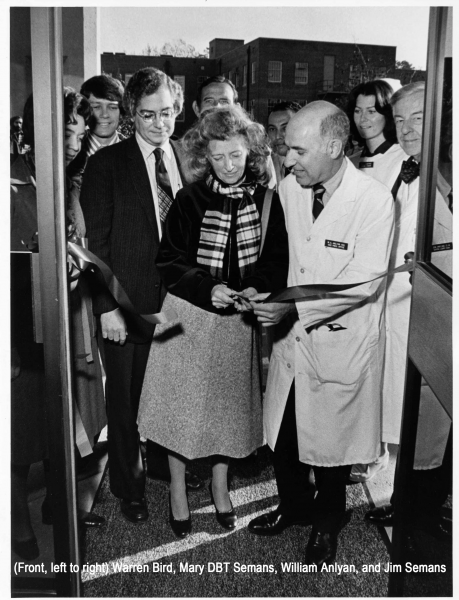
Serving as a member and chairman of the National Library of Medicine’s Board of Regents, Dr. Anlyan understood the potential and importance of libraries in an academic health center and as part of the developments in biomedical communications. In 1970, he commissioned the architects to create a building with the concept of the library as the core of the communications center. Construction began in 1973 on the triangular shaped facility designed by Warner, Burns, Toan and Lunde and was positioned near the old Duke South hospital. Ultimately, the new Duke North hospital was built on the other side, leaving it halfway between the two major clinical enterprises.
Working with the current Library Director and staff, Dr. Anlyan sought the funding and other resources necessary to build the Seeley G. Mudd Communications Center and Library building. The Seeley G. Mudd Fund, which supported a number of library and learning resource facilities across the country during the 1970s, provided a major grant. With additional funding sought from the Andrew W. Mellon Foundation, Frederick J. Kennedy Memorial Foundation, Nanaline H. Duke Fund, and the Duke Endowment, the new location for the Library became a reality. When opened in 1975, the Library was the only unit in the building occupying the top four of the five levels, with the ground level shell space that would become the Searle Center.
Under Dr. Anlyan, the Library went from cramped quarters in the basement of the Davison building to a modern facility equipped with the technology of the day including slide equipment, audio tapes, closed-loop film projectors, and microform machines. The plans also focused on closed-circuit television, video recordings, and the testing of computer-assisted instruction. Even though this was very forward thinking for its era, Anlyan also thought of the past and supported the inclusion of a greatly expanded History of Medicine Collection and Reading Room, as well as the move of the Trent Room (now Richmond Room) from Davison basement to Mudd.
Under his leadership, the Library also received support to build a strong book and journal collection, becoming a major resource library for other health care institutions in North Carolina and the southeast region. The Library continues to serve as a designated resource library in the National Library of Medicine’s National Network of Libraries of Medicine.
When I first arrived at Duke, Dr. Anlyan was no longer the Vice President, but he was still a major force and presence across the medical center and university, as well as within the Mudd building. I was told that when he retired as VP, he asked for his office to be located in “his building, his library,” and he was a neighbor in the Mudd building for many years. I had many delightful conversations with him as he asked about changes in the Library and where its future was going.
Probably little did he know the importance of the location that was chosen under his leadership. The Mudd building and Library are now surrounded by expanded educational, research, and patient care facilities. The 1976 dedication materials stated that the “Communications Center and Library now has the potential to become a true intellectual hub from which can emanate a continuing flow of biomedical information.” The students, researchers, faculty, and clinical staff who use our facility and digital resources today are a tribute to his vision when he pursued the construction of the Library facility and Mudd building.
Featured Engel Books
Barbara Dietsch, Acquisitions Manager, Collection Services
These books are part of the Library’s special collection established in memory of Dr. Frank Engel, who always thought students should have other reading sources that took them beyond their medical studies.
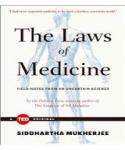 The Laws of Medicine: Field Notes from an Uncertain Science
The Laws of Medicine: Field Notes from an Uncertain Science
Siddhartha Mukherjee
A Pulitzer Prize-winning author and one of the world’s premiere cancer researchers reveal an urgent philosophy on the little-known principles that govern medicine and how understanding these principles can empower us all. This is essential, required reading for doctors and patients alike. (Review: Amazon)
Stories From the Shadows: Reflections of a Street Doctor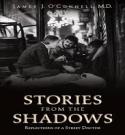
James J. O'Connell
This collection of stories and essays, written during thirty years of caring for homeless persons in Boston, gently illuminates the humanity and raw courage of those who struggle to survive and find meaning and hope while living on the streets. (Review: Amazon)
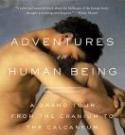 Adventures in Human Being: A Grand Tour from the Cranium to the Calcaneum
Adventures in Human Being: A Grand Tour from the Cranium to the Calcaneum
Gavin Francis
In Adventures in Human Being, award-winning author Gavin Francis leads readers on a journey into the hidden pathways of the human body, offering a guide to its inner workings and a celebration of its marvels. (Review: Amazon)
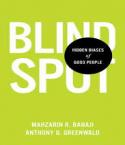 Blindspot: Hidden Biases of Good People
Blindspot: Hidden Biases of Good People
Mahzarin R. Banaji and Anthony G. Greenwald
Blindspot is the authors’ metaphor for the portion of the mind that houses hidden biases. Writing with simplicity and verve, Banaji and Greenwald question the extent to which our perceptions of social groups - without our awareness or conscious control - shape our likes and dislikes and our judgments about people’s character, abilities, and potential. (Review: Amazon)
Suggestions for purchases? Complete our online Recommend a Purchase form or contact Emma Cryer Heet. For a complete list of titles added to our print book collections within the last 3 months, check out the Library's newest print book additions or subscribe to our "New Books" feed.
Exhibits on Display
Jolie Braun, Assistant Director, Medical Center Archives
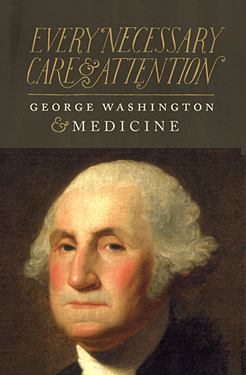 Currently On Display
Currently On Display
Every Necessary Care and Attention: George Washington and Medicine
Medical Center Library & Archives - Level 2R
On Display February 8 - March 20, 2016
The Medical Center Library & Archives is hosting "Every Necessary Care and Attention: George Washington and Medicine," a six-banner traveling exhibition. Developed and produced by the National Library of Medicine, National Institutes of Health with George Washington's Mount Vernon Estate, Museum, and Gardens, the display explores the story of George Washington’s own health and examines the ways in which he sought to safeguard the health and wellness of his family, staff, slaves, and troops.
Washington’s story also illuminates the broader context of the experience of illness and the practice of medicine, which during his time was transitioning from a traditional healer craft to a profession.
In conjunction with the NLM display, the Library will produce a companion exhibit, "Presidential Illnesses," featuring other presidents who faced critical health issues. This exhibit will be on display from March 11 - May 27.
Publishers to Require ORCID Identifiers for Authors
Emma Heet, Associate Director, Collection Services
A group of seven publishers recently announced that in 2016, they will begin requiring authors to use an ORCID identifier during the publication process. The American Geophysical Union (AGU), eLife, EMBO, Hindawi, Institute of Electrical & Electronics Engineers (IEEE), and the Public Library of Science (PLOS) will join the Royal Society – which already requires its authors to include ORCID identifiers at submission – in making this commitment.
An ORCID identifier allows easy identification and disambiguation of publications for their corresponding authors. Over 1.8 million researchers globally have already adopted an ORCID identifier to ensure that their published research output is properly credited. As unique as a social security number, ORCID provides a persistent identifier for an author’s research profile and publication roster. With ORCID, being one of 700 P. Smith’s with articles published in Nature, will no longer be a problem! More publishers will undoubtedly follow the precedent set by the Royal Society, so don’t delay. Register to get your ORCID today!
For more information on enhancing and maintaining your research profile at Duke, see our online guide on “Getting Published.”
Staff News
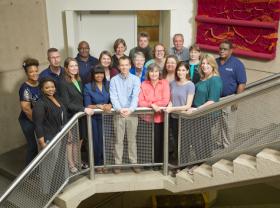
Megan Van Noord, Research & Education Librarian, has coauthored the article: Rand N. Wilcox Vanden Berg, Emily N. Bierman, Megan Van Noord, Henry E. Rice, and Jonathan C. Routh, "Nephron-sparing Surgery for Wilms Tumor: A Systematic Review," Urologic Oncology: Seminars and Original Investigations, 34(1):24-32, January 2016.
Megan von Isenburg, Associate DIrector, Research & Education, has coauthored two articles: 1) "Road Traffic Injury Prevention Initiatives: A Systematic Review and Metasummary of Effectiveness in Low and Middle Income Countries," Catherine Staton, Joao Vissoci, Enying Gong, Nicole Toomey, Rebeccah Wafula, Jihad Abdelgadir, Yi Zhou, Chen Liu, Fengdi Pei, Brittany Zick, Camille D. Ratliff, Claire Rotich, Nicole Jadue, Luciano de Andrade, Megan von Isenburg, and Michael Hocke, published in PLoS One, 11(1) January 2016. 2) "CKD of Uncertain Etiology: A Systematic Review," Joseph Lunyera, Dinushika Mohottige, Megan Von Isenburg, Marc Jeuland, Uptal D. Patel, and John W. Stanifer, published in Clinical Journal of the American Society of Nephrology, December 2015.
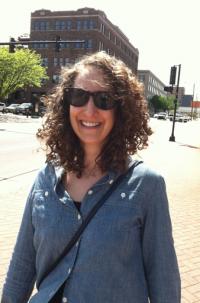 Welcome to Lucy Waldrop
Welcome to Lucy Waldrop
Jolie Braun, Assistant Director, Medical Center Archives
The Medical Center Library & Archives is happy to introduce our newest staff member, Lucy Waldrop. She joined the Archives in January as Associate University Archivist.
Lucy comes to Duke from Stanford University, where as Project Archivist for the Helen and Newton Harrison Papers, she processed over 250 linear feet of material. Her previous positions include Project Archivist at Wichita State University and AmeriCorps volunteer in Letcher County, KY. She holds an MLIS with a concentration in Archival Studies and an MA in History, both from the University of Wisconsin-Milwaukee, and a BA in American Studies from Skidmore College.
As Associate University Archivist, Lucy will work with Duke Medicine departments to transfer materials to the Archives. She will also process collections, create finding aids, help supervise the Archives’ two student interns, and work with the Archives Director and Assistant Director to provide access to materials. She is looking forward to helping document and preserve Duke Medicine’s history.
In her spare time, Lucy enjoys yoga, hiking, and spending time with her cats. She is excited to begin exploring Durham and irritating her family members (University of Kentucky fans) with Duke gear.
Improve Your Library Research Skills!
The Medical Center Library offers training on a variety of topics. Request a session for yourself or a group, or schedule an appointment for a research consultation.
Publication Schedule & Staff
Duke University Medical Center Library & Archives News is published bimonthly.
| Pat Thibodeau, Associate Dean | Beverly Murphy, Editor |
| Editorial Board: | |
| Jolie Braun | Jamie Conklin |
| Barbara Dietsch | Megan von Isenburg |
Subscribe to our newsletter and be notified when a new issue is published!
